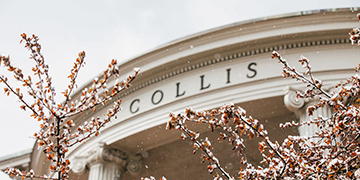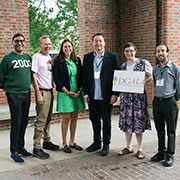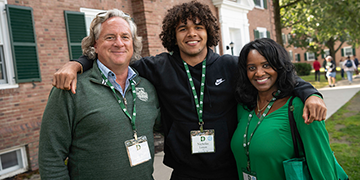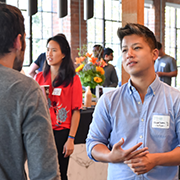Our Dartmouth Experience, as Alumni and Professors
Two faculty—one retiring, one beginning his teaching career—discuss their undergraduate experiences and what it takes to be a successful teacher today
Nov 12, 2024
8 minute read
Zee LaFon
8 minute read
Susan Ackerman ’80 is the Preston H. Kelsey Professor of Religion. She joined the Dartmouth faculty in 1990 and teaches courses on ancient Middle Eastern history, mythology, and religion.
Herbert Chang ’18 is an assistant professor of quantitative social science. He began teaching in the fall. He studies and teaches data-driven classes on artificial intelligence, social media, and how technology impacts human relationships.
The Undergrad Years
Susan
The prevailing issue during my entire undergraduate career was how to negotiate coeducation and move it forward. I came to Dartmouth in the fall of 1976. There were women in all four classes, but not very many. When I was an undergraduate, there was a rigidly mandated quota that there would be 250 women to 750 men in every undergraduate class. The Class of 1996 was the first to have more women than men—that was one more woman, I believe, than the men. It was a long process to really get to 50/50 in terms of coeducation.
In my senior year, I completed what was then called a “certificate” in the women’s studies program, which is now the Women’s, Gender, and Sexuality Studies program. A certificate was the equivalent of a minor. It was six courses. And I crammed all those six courses into my senior year. I was so impacted by these issues, because I was living in an environment where those issues were so alive.
Herbert
For me the prevailing issues have not changed much since it’s only been six years since graduation. There was Brexit, the height of the MeToo movement, and Black Lives Matter. There was a critical juncture during the 2016 presidential elections when people were thinking about social media, and studies were coming out on its impact on students and mental health. That was one the big issues during my time at Dartmouth; it obviously impacted my interest in research and teaching.
Today's Experience
Herbert
Students today are asking “What should I major in?” They want to know how to make sense of their place in the world. It’s a prevailing issue for all undergraduate students.
Susan
The invention of the iPhone in 2007 absolutely changed student culture in ways that, in my early career, I could have never dreamed.
The financial crisis of 2007–2008 presented a crucial nexus in our history. It caused students to start thinking more instrumentally about how they structured their four years at Dartmouth. For example, in the 1990s the two most popular majors at the College were English and history. Today it’s economics, and then disciplines like computer science, engineering, and government. That’s a profound shift.
I was a religion major, and there were about 30 religion majors in my class of a thousand students. Today we have five to maybe eight religion majors each year, and they’re almost always double majors who describe religion as the major of their passion, and, let’s say, government as their practical major, because they’re thinking, “What's useful for me to major in? What is going to get me a job?” I don’t think students asked that so much 30 years ago.
Herbert
I understand why there is this type of mentality now. That reflects my own choices as well. I was a math major and I also did a senior creative writing fellowship.
How Dartmouth Changed Me
Herbert
Dartmouth changed me in a lot of ways. It helped shape my few years after graduation and was the major influence on what I was interested in studying.
The biggest impact was when I arrived on campus. I’m an international student from Taiwan, so this is where I grew up. Every person that I met was from a very different background. My roommate was a Ukrainian-American guy from New York. All my friends came from different parts of the world, and surrounded by all this diversity, I also became more aware of my own identity. As a result, I committed more of my research and writing to understand this identity better.
I had many mentors here. They were so multiplex in their interests and understanding of different areas of knowledge. I had a lot of them outside of my major.
Susan
I came to Dartmouth from Little Rock, Arkansas, a very, very different place than northern New England—especially in 1976. So, my Dartmouth experience opened me up to a different way of living in a whole different kind of place. There was the New England snow, and real winters. But I think the most profound thing I found at Dartmouth was living in such an engaged, intellectual community.
My parents both worked at the University of Arkansas, so I came from a very intellectual home, but not in a broader context in terms of my high school, my peer group, my friends. To suddenly be in this community where everyone was so smart, smarter than I was… that was eye-opening to me. I was one of those kids who made that phone call the first week to my parents saying I’m not smart enough to be here, I need to come home. They told me to at least give it another week before I bailed.
Teaching at Dartmouth is Different
Susan
My professors in women’s studies and religion were unbelievably important to me. When I came back and joined the faculty in 1990, it was in part because those professors and colleagues would be the people I would be working with day in and day out. That was an amazing gift.
Herbert
It’s great to hear that from your perspective. That’s the transition I’m going through right now. The person who determined whether I passed my final thesis or not is now my department chair; I get to see them every day. So many mentors are now colleagues, and it’s amazing.
Susan
After graduation I immediately went into graduate school at Harvard. One of the shocking things I quickly learned was that the professors would come into class to give the lectures, but discussion sections and grading were done by upper-level graduate students. So even though I was a graduate student, I had less access to the professors at Harvard than I had to the professors at Dartmouth. And that really impacted me, especially when I came back here to the kind of education and contact with professors that I had valued so much as an undergraduate. I was absolutely determined to try and be that “available” professor.
Herbert
Yes. I went to USC, also a huge school, and I think I felt the same thing about being a graduate student and the grading. Because Dartmouth has such a stellar suite of professors, I bounced around different departments because all the classes were very interesting. I was very interested in music as well. My first research project was in music. I invented an instrument with the music professor. He took me to my first conference in Brisbane, Australia, where I hugged my first koala—which was amazing—and a lot heavier than I expected.
Going through the music department, the math department, and creative writing, I really got a sense of what effective teaching meant for interdisciplinary programs. There are elements of that that I can pull in…. For instance, in mathematics, a lot of the courses are like working in Blackboard… and you’re doing proofs on the board. Understanding and writing out the logic step by step has been very effective in teaching students how to code.
It’s important that students have time to get their hands dirty outside of the classroom. Our professors are practitioners, too. I remember this wonderful night, probably around 9 p.m., and Professor Chee, a creative writing professor, joined me and a few students to do a writing session outside of class. I want to embody that same level of commitment to student education here.
Susan
One of the things that strikes me about that story is how much opportunity for individual mentorship there is here. There’s a sense of community and access that can create a very nurturing environment.
Herbert
At the beginning of every term, I take an online poll. Students use their smartphones to identify their major. In the past two courses I’ve taught, I think I see a shift toward pragmatic double majors, a desire to be part of something bigger, like civic engagement or campus life. A lot of my students are very interested in climate change.
Susan
I would agree with that. It’s way above my pay grade to try and diagnose other reasons for this. We live in a different economic world. I think students are absorbing some anxiety from their parents about, “Well, how are you going to make a living? How are you going to have a good salary?” And that causes them to think very pragmatically. Anyone in higher education today must think about the soaring cost of education—the money families are paying for students’ education and the return on investment. Covid really raised some important questions, existential ones about the meaning of life, about purpose, and what you want to accomplish in your life.
On Campuses Right Now
Susan
We are seeing a lot of student passion right now, around global political issues. Sometimes we’re seeing it well expressed, and sometimes we’re seeing it naively expressed. But it is energizing to be around all that passion and that degree of student concern… thinking beyond just what’s going to get me a job, but also what the world I’m going to live in and inhabit will be like in the future. And how do I want to be a part of shaping that world?
How Can a Professor Support Students’ Educational Journey?
Susan
If I’ve learned anything in my 34 years, it’s that students thrive best when they receive time from their professors. We value and pride ourselves on that at Dartmouth.
Herbert
The thing I’ve learned is the importance of my own time management, especially if I want to do good by my students and give them the attention they deserve and need for their projects.
Susan
There is also the need to fulfill other expectations Dartmouth has for faculty regarding scholarly production and your own development as a knowledge producer and as a scholar. And the expectations as you go through your career about service and committee work, finding the ways to fit all those in, can really be tricky.
Herbert
I was thinking about your point about time. Committing time to students really does help them get through the anxiety, especially, in terms of like what I’m going to do after graduation. It’s important to give them the truth, but also affirmation.
The big theme of our class is data science and artificial intelligence (a phrase coined here at Dartmouth). A lot of entry level jobs might be swept away because of automation, and that is a source of anxiety. I tell students to leverage AI, to be above that 80th percentile of people who know how to use it.
What's Next?
Herbert
Coming back to Dartmouth was an easy decision. I like the supportive environment where you can just email a colleague to grab a bite. I just had lunch with the administrator for history, who was super kind to me during my time at Dartmouth. So beyond just the intellectual discussions, it’s also just the person-to-person contact.
Dartmouth was my first home away from home when I came from Taiwan—my first taste of America. It felt very easy to come back. And I do like the quarter system of nine to ten weeks of intense teaching and study.
Susan
I’m retiring, so obviously I’m giving up teaching, but I don’t see myself giving up the other major part of my career—my scholarship. I’m working on a book right now and I need my libraries, so I can’t drift too far from Baker-Berry.
Herbert
Do you have any advice for me?
Susan
Sure. Enjoy every minute of it. It’s been a great career. Dartmouth is an extremely supportive, nurturing community and a great place to work. I’m privileged to have been a part of it.
Herbert
Thank you, and congratulations on your retirement.






